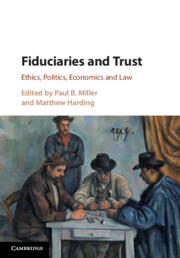Book contents
- Fiduciaries and Trust
- Fiduciaries and Trust
- Copyright page
- Dedication
- Contents
- Contributors
- Acknowledgements
- Introduction
- Part I Personal Trust and Fiduciary Relationships
- Part II Personal Trust and Fiduciary Duties
- 6 Stakeholder Fiduciaries
- 7 Trustees and Agents Behaving Badly
- 8 Conflict, Profit, Bias, Misuse of Power
- Part III Political Trust and Fiduciary Government
- Part IV Trust and Fiduciary Law in Context
- Index
8 - Conflict, Profit, Bias, Misuse of Power
Dimensions of Governance
from Part II - Personal Trust and Fiduciary Duties
Published online by Cambridge University Press: 13 March 2020
- Fiduciaries and Trust
- Fiduciaries and Trust
- Copyright page
- Dedication
- Contents
- Contributors
- Acknowledgements
- Introduction
- Part I Personal Trust and Fiduciary Relationships
- Part II Personal Trust and Fiduciary Duties
- 6 Stakeholder Fiduciaries
- 7 Trustees and Agents Behaving Badly
- 8 Conflict, Profit, Bias, Misuse of Power
- Part III Political Trust and Fiduciary Government
- Part IV Trust and Fiduciary Law in Context
- Index
Summary
Norms prohibiting conflicts of interest apply in private fiduciary relationships and also to many public office holders. Whether or not such relationships are founded on trust, such norms can cultivate trust towards those holding governance authority, whether in interpersonal, civic or political relationships. In legal and philosophical discourse, however, conflicts of interest are rarely carefully defined. It has become a commonplace that ‘not every breach of duty by a fiduciary is a breach of fiduciary duty’. We must now go on to realize that ‘not every improper action by one who must avoid conflicts of interest is a conflict of interest’. A conflict of interest arises when duty-bound judgment is exercised in the presence of a conflicting interest. There can be conflicts that are not conflicts of interest; and there can be potential conflicts as well as actual ones. The simple misuse of power is not itself conflict of interest; on the contrary, it is the problem that the rules that forbid acting in a conflict situation aim to avoid. Bias is not identical with conflict of interest, although some kinds of bias arise from conflicts. Unauthorized profits are none of the above. They represent a different dimension of the relationship: not the supervision of powers, but the simple fact that when acting for another, one may not extract benefits for oneself. The rules about conflicts can foster trust in proper decision-making, while the rule against unauthorized profits can foster trust in the proper separation between a person’s private and official actions.
Keywords
- Type
- Chapter
- Information
- Fiduciaries and TrustEthics, Politics, Economics and Law, pp. 149 - 172Publisher: Cambridge University PressPrint publication year: 2020

